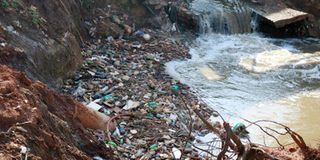Plastics still biggest threat to water resources- WWF

Plastic waste piled in Nakivubo Channel which connects to Lake Victoria. Photo By Gabriel Buule
What you need to know:
- WWF Uganda a major stake holder in the fight against environment degradation launched the earth hour campaign aimed at stopping the use of plastics.
Plastic waste in lakes, rivers, wetlands and other water bodies is now a global issue that cannot be ignored because it is pausing a major challenge to the aquatic creatures.
Mr David Duli, the country director World Wide Fund for Nature (WWF) said the dangers of deadly plastics are worthy highlighting.
“There is a common saying that water is life which nobody can dispute but that water needs to be safe. It needs to be enough and it also needs to be recycled because water is finite therefore, if it’s not there then you will go into a situation where you don’t have,” he said during an event to celebrate the water week together with the Ministry of water and environment.

Mr David Duli, the country director World Wide Fund for Nature (WWF)
WWF Uganda a major stake holder in the fight against environment degradation launched the earth hour campaign aimed at stopping the use of plastics.
Mr Duli said the toxic wastes that come with plastics end up in Uganda’s water bodies.
According to study by the Global Water partnership in East Africa, plastics take not less than 400 years to decompose.
Studies by a consortium of NGO’s reveals that the population are releasing 600 tonnes of plastic in Kampala every day and less than three percent is properly disposed off and then reprocessed. The rest get into the environment soils.



